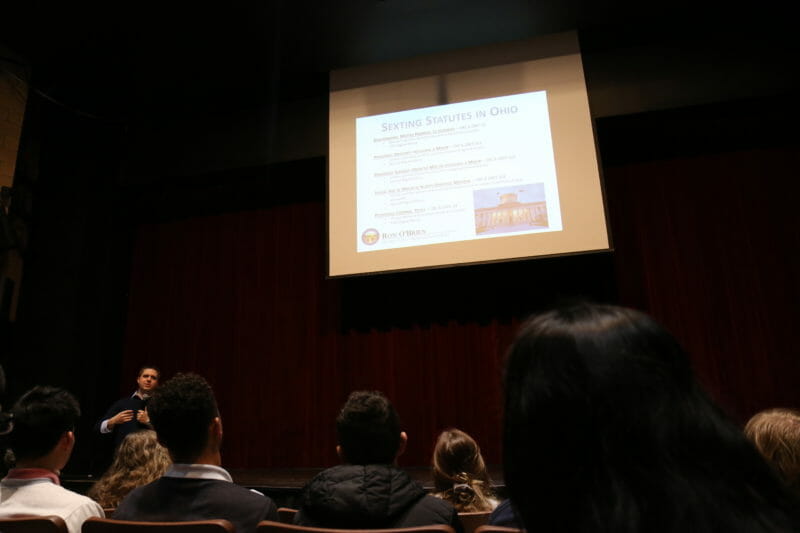Zach Imwalle from the Office of Franklin County’s Prosecuting Attorney, Ron O’Brien, speaks to Upper School about smart cyber communication. (Chris Heerman’18/Media Editor)
You can’t control what you receive, but you can control what you do about it.
This is the urgent message that law enforcement is currently attempting to spread to teenagers on the subject of smart, online communication.
In the digital age where we can send instant messages over several different social media platforms and photos that seemingly disappear after a few seconds, it is more important now than ever that adolescents are informed on the necessary precautions that must be taken in protecting themselves from breaching any cyber communication laws that they may be completely unaware of.
With a strong priority placed on student safety and education as always, Columbus Academy proactively decided to hosta guest speaker to discuss the inadvertent consequences of inappropriately using technology.
On Friday, January 26, Academy’s upper schoolers attended a special assembly to hear from Zach Imwalle, Assistant Prosecuting Attorney, who works at Attorney Ron O’Brien’s Franklin County Prosecuting Office.
Imwalle explained the details of the regulation that was passed to outlaw child pornography nationwide in 1996. The federal law made the production, possession, distribution, and selling of pornographic content involving the exploitation or portrayal of a minor, a felony offense.
As technology has advanced much more quickly than legislation can keep up, the outdated statute now applies also to nude photos that an overwhelming portion of the teenage population today has either requested, taken, received, or sent.
During his presentation, Imwalle cited several eye-opening figures of data. A recent survey from the American Academy of Pediatrics suggested that in the United States, 27 percent of teenagers admitted to sending a nude photo of themselves to someone else.
For those who think that the law can be bent without facing any consequences, they should consider the next piece of information. Since 2014, 59 juveniles ages 12-17 have been charged under Ohio’s child pornography regulation in Franklin County alone.
If found guilty of the crime, a teen’s next course of actions is determined by the judge, who can choose from a variety of repercussions such as juvenile prison, probation, implementing a curfew, house arrest, community service, and perhaps the most serious: a sex offender registration. Whatever the case may be, it will go on one’s permanent record. As employers and colleges have access to applicants’ records, making this one mistake could jeopardize job opportunities, financial aid options, and loom over the person for the entirety of his or her life.
Even if teenagers avoid requesting, taking, and sending nude photos, that does not mean they are not at risk of being on the receiving end. Regarding the off- chance that they receive inappropriate content involving the exploitation of a minor, Imwalle suggested doing two things. First, delete it. Second, report it.
Suspected child pornography offenses should be reported to the following points of contact:
Local Police
Columbus Police Exploited Children Unit
(614) 645-4670
Ohio Internet Crimes Against Child Task Force
(614) 525-3448 – Franklin County
(440) 886-5284 – Statewide
National Center for Missing and Exploited Children
www.cybertipline.com 1-800-843-5678








